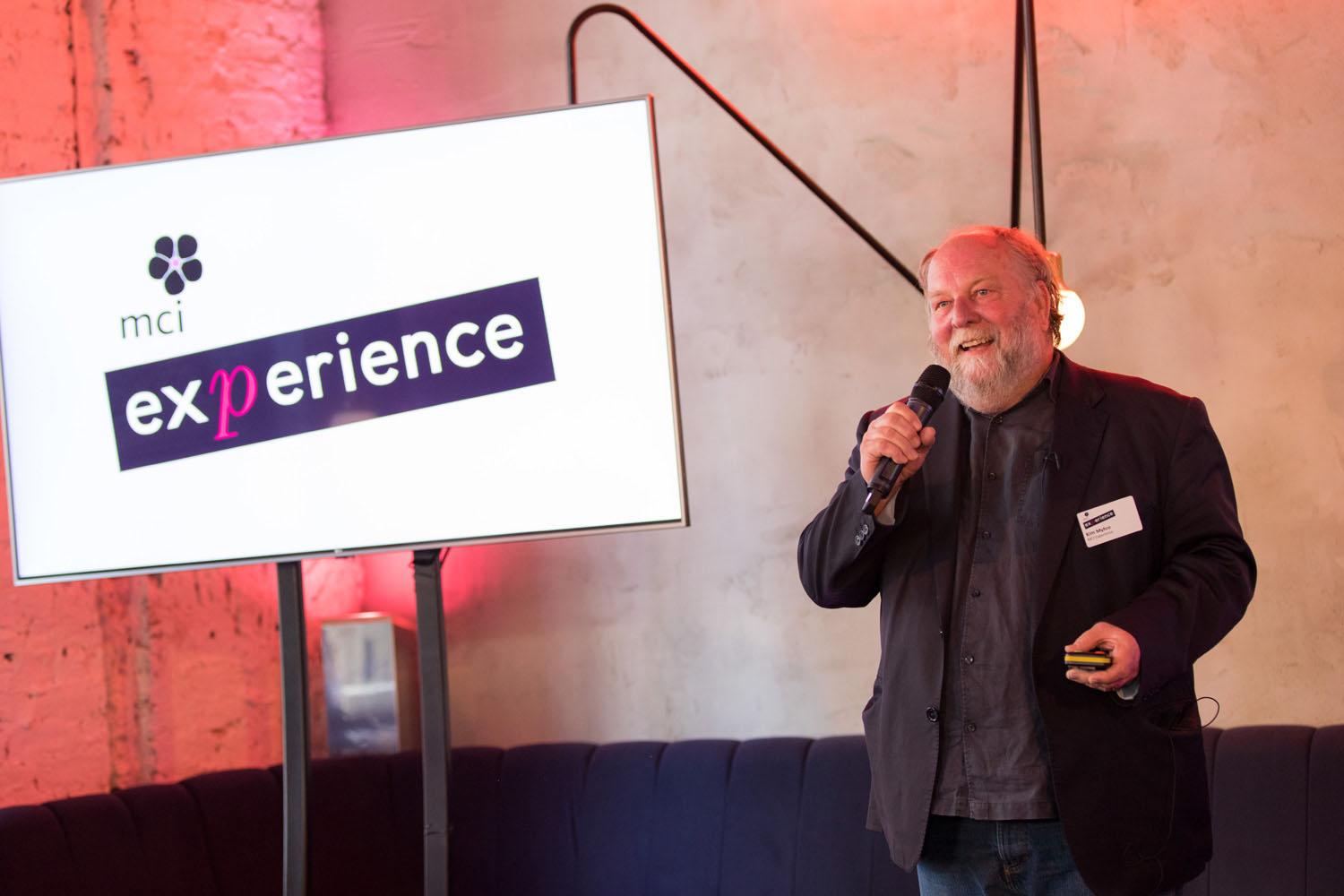”Design thinking is an approach used by designers to solve complex problems and find desirable solutions for clients,” says Kim Myhre, managing director of MCI UK and MCI Experience. “A design mindset is not problem-focused, it’s solutions-focused and action-oriented towards creating a preferred future.”
He says applying the principles of design thinking to experience design can deliver engaging experiences and powerful outcomes for brands.
”The principles of design thinking—inspiration, ideation, implementation and evaluation—enable us to move from the more traditional approach to event planning towards a more attendee-centric, insights-driven and strategic way of planning event experiences,” he says.
Myhre, an intersectional design thinker, thought leader, innovation activist and brand storyteller, has been designing and creating branded experiences for more than a quarter of a century. He will be presenting “An Introduction to Human-centric Experience Design” at next month’s MPI European Meetings & Events Conference (EMEC) in The Hague, the Netherlands, Feb. 9-12, so we asked him about creating impactful experiences for meeting attendees.
Learn more about and register for EMEC here.
What approach/mindset will help planners create events that feel personal to individual participants?
In design thinking, the focus is on the people and experience. It is a human-centric approach to event planning that helps us to apply a deep, empathetic understanding of our attendee’s wants and needs, while encouraging creative consideration of a wide array of innovative event experiences and solutions. Utilizing data-insights from marketing and previous event analysis will help inform a more personalized approach to your event experience design.
How can a planner seamlessly work a CSR element into their event design?
It’s clear that brands now want their event experiences, in addition to serving their commercial interests, to also stand for and achieve social good. Even today’s event content is beginning to focus on attendee well being and how the experience can help to make a difference in the world. There is also a growing number of highly influential, social good agenda-setting conferences and events like the World Economic Forum, Wired and even TED Talks. These sessions work so well because they also serve a purpose to inspire audiences to make a positive impact on their own lives as well as the world around them.
The trend for events to become more purposeful is going mainstream. That can’t be a bad thing. Making events more purposeful, meaningful and impactful is positive progress. There is still some heavy lifting to be done to deliver on the promise of purposeful experiences. We often use words such as insightful, innovative and purposeful to describe the brand experiences we create, without seriously moving the needle on social, environmental or well being initiatives. Making meetings purposeful sees us embark on a journey of the reinvention of our traditional approaches to event planning. This too is a good thing.
Can you give an example of an effective online experience that increasingly helps attendees actively engage with a live event?
The world of competitive video gaming is a fast-growing international phenomenon with millions of fans and billions of dollars up for grabs. Streaming services and live events have turned casual gamers into serious stars, some of whom can rake in seven-figure earnings and massive brand endorsements. These gamers are watched and followed by millions of fans all over the world, who attend live events or tune in on TV or online. Last year alone saw around 380 million fans tuning in. Streaming services like Twitch and Disney HD allow viewers to watch as their favorite gamers play in real time, and this is typically where popular gamers build up their fandoms. Brands like Coca Cola have got in on the action with creating viewing parties in cinemas to create a sports-like arena experience for those fans who can’t attend the actual championship finals, but can still engage with the live stream. It’s an exciting time to see that events are not restricted to site-specific experiences, but can be shared across live channels with wider audiences.
Why are you passionate about events?
I have always been a believer in the power of experience to engage and empower audiences to take action. But through all the years there has been the constant—that experience marketing continues to change. The nature of event audiences is changing. The days of thinking of event goers as a passive audience are gone. Today’s event audiences are much more demanding, more impatient and have high expectations that events will be more engaging, personalized and participatory. Thinking about events in a traditional, logistics-led way limits our potential to create engaging brand experiences that connect attendees in much more meaningful, memorable and shareable ways.
If EMEC delegates can take away one thing from your presentation, what do you hope it will be?
New breakthroughs in experience design and technology have now empowered brands to create much more personalized and more integrated live and online experiences. But in order to take full advantage of these opportunities we are going to have to master some new skills.
Relying on the traditional approaches and expertise that the events industry has been using for years to design event experiences will not be sufficient to create the next generation of event experiences. A new interdisciplinary approach that engages a much wider range of skills and disciplines is the future of experience design.
During my presentation, we will discuss the major phases of the design thinking process and explore ways that we can apply this approach to our own work as event planners.
I hope that event planners will be inspired to utilize design thinking as a dynamic, solutions-focused way to evolve how we experience events.



